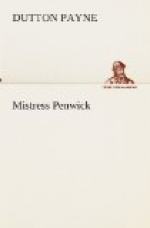“Aye, thou art most welcome, Lady Constance,” replied Katharine. And they sat over the fire laughing and chatting. Katherine was all excitement and full of clatter, for ’twas her first “company,” and she was a young lady and could now boast of tender looks and words from beaux. And her volubleness led her to tell of her convent life, of her sudden surprise and pleasure of coming to England; and on and on; and blushing, she thought with Constance that Adrian Cantemir was indeed very charming, and having become better acquainted with him, she felt sure she admired him quite as much, or more than, any one else; and she was so fond of music he fairly entranced her when he played.
“To-morrow he is to teach me battledore and shuttlecock in the library.”
“’Tis great sport and a game that requires some skill,” said Constance. And thus they talked for one good hour, and in the adjoining room Janet fumed and fretted; for ’twas far past her child’s bedtime.
“Such late hours are not conducive to youthful roundness and a clear colour,” she grumbled. Constance yawned and declared she must retire; but she was thirsty and must have a drink, and yet she supposed she must do without, for all the maids and lackeys were abed.
“But the more I think of it, the more I want it. I will get it myself.”
“And I will accompany thee, for I would like not to go alone in so great a house, when there is no one astir,” said Katherine.
They started forth adown the stairs; and following silent, noiseless like a wraith was Janet, expectant, eager; for she felt she was to see the opening of a great battle. Constance led the way, carrying a taper. As they traversed some passage, their ears caught the sound of music. They listened a moment, then Constance proposed they snuff the candle and draw near the sound; “for very like the beaux were having an orgy,” she said. And Katherine, full of adventure and deeming it a fine, young lady’s trick—she had heard talk of such things among the older girls at the convent—opined “’twas the thing to do.” And they followed the passage until an arched and curtained doorway but screened them from that ’twas within the grand saloon, and Constance made bold to draw aside a finger-breadth of the sweeping curtain and peep within.
“Ah! ah! ’tis a beauteous sight!” and she turned from what she saw and drew the curtain to a generous opening; and the two with heads together looked through.
Every candle had been snuffed and through the great north window came the rays from the light in the forked tree that fell like moonlight athwart the saloon. In the centre of the broad gleam was a sylph-like form, keeping time to the music in a sort of phantom style of movement; twisting, shimmering folds that appeared to effuse a scintillation of opal shades. ’Twas the chaconne; slow, graceful and full of romance, the full major lifting and seeming to float, at last dying imperceptibly into the minor passacaille. About were seated, carelessly and after the manner of men who had pulled at the bottle for hours in the hunting field and were now somewhat overcome by warmth and ennui, beaux old and young, ’suaging their appetite of mouth and eye by wine and women.




